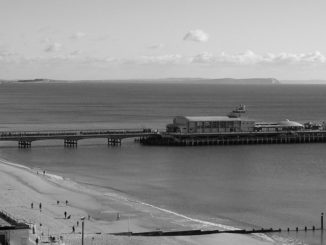
Hamburg,
Unknown photographer – © Newspapers.com, reproduced with permission
You climb into an aeroplane at Amsterdam Schiphol and as soon as you are comfortably airborne, you order an excellent dry sherry and nibble at a picnic lunch which you don’t really need. You try to follow your route with the map obligingly supplied by British European Airways.
But from six thousand feet one field looks very much like another, and it’s all very small and very far away and unimportant. The pounding rhythm of the airscrews turns into something which might have been delivered by Benjamin Britten in an off-moment. And suddenly, somehow, everything that matters is a million miles away…
The next thing you know the stewardess is shaking you gently and you wake up and start fumbling with your safety belt. And you are dropping down out of a clear sky into a world of neat green fields and red wide-gabled roofs.
This is Sunday morning in Germany and the church bells are ringing. And as you walk towards the Customs shed you notice a friendly Union Jack flying high over the control tower. And it’s just like coming home…
And then, suddenly, you realise that it isn’t like coming home at all.
For on the other side of the Customs shed a queue of men and women and small children is waiting patiently for someone to take notice of them. They are all ages and all conditions. They carry neat briefcases and old bulging Gladstone bags and parcels tied up with newspaper and string.
Some are smart and some are shabby. Some look plumply prosperous and some as if they haven’t eaten a decent meal for a week. But all have indelibly stamped on their faces that blank, hopeless, unquestioning look of the modern refugee.
These people are Germans escaping from Germany into Germany. Some of them have come from homes less than 60 miles from here where I am standing. Homes that many of them left in stealth and never expect to see again.
Imagine that it is England, not Germany, that is occupied and divided. Imagine that all Yorkshire is in the Russian zone and you are a Yorkshireman in Huddersfield who has come to the end of his tether.
You decide to leave it all behind you and escape, if you can, into Lancashire, which is in the American zone, and therefore free.
No good taking the obvious route. For every road to the West, every path across the moors, is guarded by black-uniformed People’s Police…
So you go the long way round. You apply to the Russian authorities for a pass to visit London, which is an international city under Four-Power control.
The pass takes you as far as Aldgate, in the Russian sector of the City. Then one morning, with your heart in your mouth, you ever so casually buy a ticket on the Underground for Tottenham Court Road. You leave the train there, still on Russian-occupied soil. But you know that on the other side of Oxford Street is the French sector.
So instead of taking the lift or the escalator — for the People’s Police will be waiting for you at the top — you scuttle up the emergency staircase. Until you come up into the sunlight, and only 20 yards away on the opposite side of the street is freedom.
You wait your chance, pretend to step out into the road to hail a cab — then run for it. You feel the curb under your feet and shut your eyes and gasp for breath. No. No hand on your shoulder.
A London bobby on the French side who has watched the whole thing winks sympathetically. And you know you are free. Penniless — a displaced person but wonderfully, unexpectedly free.
Now you are on your own. For, remember, officially you are a man without a country now. There is no consul to go to for help. The few East British pounds in your pocket are practically worthless over here.
You are still aiming to reach your married sister who lives in Manchester in the American zone. But all the Home Counties and most of the Midlands lie between here and there. And that is all Russian territory. Your only way out now is by air along the neutral air corridor.
So you sell your watch — sell everything you have — until you’ve enough to buy a precious air passage to Manchester. You queue up day after day at the air booking-office and pray for a priority. And then one morning — still only half-believing — you are dropping down at Ringway under the comfortable protection of the Stars and Stripes. It has taken six weeks. You have burnt your boats now. You can never go back. But for you it is the end of the beginning…
And so they trickle across the border. Two and a half thousand every day. Nearly 20,000 every week. One and a half million of them in two years. Until there is a displaced population the size of Glasgow perpetually on the move to be fed and billeted and employed somehow.
In the shadow of this mass migration every other problem pales into comparative insignificance.
I carried the memory of it with me everywhere as I toured Hamburg in the days that followed. It is a dilemma which must come near to breaking the hearts of those people who are working so hard to get Germany back on her feet again.
For in the eight years since the war ended, they — and those foreign governments who are working with them — have worked miracles.
Starting absolutely from scratch they have rebuilt and replanned.
Here in Hamburg they faced the most hideous task of all. For this great port and trading centre, once bigger than Liverpool, was devastated more completely than any other city in Europe.
And yet life is coming back to Hamburg, coming back so fast that you have to rub your eyes when you remember what it was like five years ago.
Of course, there’s another side to the picture. The shops in the city centre are crammed with luxury goods — clothes, furniture, cars, fine foods — which would make Manchester and Leeds look shabby by comparison. But only a few moneyed folk can afford to buy them. The rest go window-shopping and count their marks carefully.
You pay little more for a new suit in Hamburg than you would in Manchester. But to keep things in their right perspective you must remember that Hamburgers are earning far less. And there are still 100,000 unemployed in this one city alone. But compared to the dreadful years before 1948 it could be a Paradise.
Yes, it could be Paradise, if only… And you are back to that same nightmare — how long can it last?
“The uncertainty of it would drive you mad if you thought about it,” said an assistant in one of Hamburg’s biggest department stores.
And since one way of not thinking about a thing is to work, Hamburgers work with an intensity that is almost painful to watch.
Like Gertrud, for instance. That’s not her real name, but it will do. And she won’t mind. Gertrud is a secretary in a city office. Until only two years ago she was a refugee, one of that million and a half with no permanent roots.
Gertrud earns 450 marks a month. Out of this she pays a hundred marks in taxes and must find another 60 to pay the rent of her tiny one-room so-called “bachelor flat.”
Fares to and from work account for another six. Which leaves her with 284 marks — or just about £16 — to see her through the month. Not a large margin — with coffee at 36s. a pound and butter at 7s. a pound. Though it’s true other foods are much cheaper and she can take her midday meal in the firm’s canteen.
She admits that she saves nothing. The future? She laughs… And there’s no humour in that laugh. What future? “Niemand wagt es Plane für die Zukumft zu schmieden.” (No one thinks about planning for the future any more.)
Entertainment, then? There’s a fine opera house, five excellent theatres, and any number of cinemas in Hamburg now.
“Thank you. But I’m too busy,” she tells you. “You see — I work.”
You see? It’s easier that way. That way there’s not so much time to think.
Reproduced with permission
© 2024 Newspapers.com
Jerry F 2024



